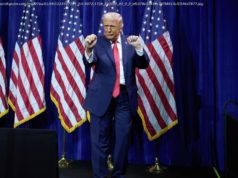A jobs boom has driven unemployment to record lows and bolstered the president’s pro-worker agenda, but tariff wars and a likely Federal Reserve interest…
A jobs boom has driven unemployment to record lows and bolstered the president’s pro-worker agenda, but tariff wars and a likely Federal Reserve interest rate hike are darkening the horizon for the Trump economy.
President Trump’s rollback of federal regulations and enactment of the biggest tax cuts in U. S. history ignited the economy. More Americans are working, wages ticked up and gross domestic product is headed toward an eye-popping 4 percent annual rate in the second quarter, according to some estimates.
It is one of the brightest spots so far for the Trump presidency and has confounded critics of his tax cuts and economic agenda.
Mr. Trump called it an “economic miracle.”
“We’re in the longest positive job growth streak in American history,” Mr. Trump declared at a White House event Thursday to spur training, apprenticeships and vocational education needed for an evolving workforce.
In the first 18 months of Mr. Trump’s presidency, employers added nearly 3.5 million jobs as the unemployment rate fell to 3.8 percent, near the lowest level since 1969.
But the 2017 mark of 2.18 million jobs added during Mr. Trump’s first year in office was lower than the number of jobs created in each of the previous four years under President Obama. In 2014, employers added 2.99 million jobs.
Stephen Moore, an economic policy analyst at the conservative Heritage Foundation, said the economic renaissance was “just getting started.”
“We’re looking at potentially two or three years of very high growth and continued strong employment. Factories and business are firing on all cylinders right now. Their biggest problem is finding workers,” said Mr. Moore, who helped craft Mr. Trump’s tax cut plan.
He also saw challenges ahead.
“There are certainly clouds on the horizon, and one of them is the tariffs,” said Mr. Moore. “Those could knock as much as a half a percentage point off of growth if this doesn’t get resolved, so that is certainly a problem area.”
Another bump in the road is more interest rate hikes by the Federal Reserve that could slow growth.
The Fed raised interest rates twice this year, and two more increases are likely before the end of the year.
In a break with the tradition of presidents steering clear of Fed decisions, Mr. Trump expressed dismay that rate hikes could take the wind out of his economic sails.
“I’m not thrilled,” he told CNBC. “Every time you go up [with growth], they want to raise rates again,” said the president. “I am not happy about it. But at the same time I’m letting them do what they feel is best.”
He worried that higher interest rates would put the U. S. at a disadvantage while the European Central Bank and Bank of Japan keep their rates low.
“I don’t like all of this work that we’re putting into the economy and then I see rates going up,” said Mr. Trump.
Federal Reserve Chairman Jerome Powell, whom Mr. Trump called “a very good man,” argues that the economy is strong enough to handle an increase in rates to normal levels.
The Fed’s benchmark rates have been kept artificially low for a decade to help sustain a painfully slow recovery from the Great Recession.
The tariff issue is more unpredictable.
The administration is using tariffs to force negotiations with major trading partners from China to Europe. Mr. Trump says the trading partners have taken advantage of the U. S. for decades with lopsided deals.
But tariffs raise prices for U. S. consumers and threaten job losses for American industries targeted for retaliation.
“It is already really hurting some people in some sectors,” said Jared Bernstein, an economic adviser to Vice President Joe Biden in the Obama administration.
However, he echoed the administration’s view that jolts to the economy from tariffs would be short-lived.
“From a macroeconomic perspective, I don’t see a trade war throwing the economy off track unless it escalates a lot more and starts to effect global supply chain and global finance,” Mr. Bernstein said.
At a Commerce Department hearing Thursday, auto industry representatives and other witnesses testified that proposed tariffs on cars and car parts would harm the U. S. economy.
Matt Blunt, president of the American Automotive Policy Council, said combining the proposed tariffs with existing levies on imported steel and aluminum “will result in a net loss of American jobs, lower capital investment and lower exports by the U. S. auto sector.”
The Trump administration in May imposed a 25 percent tariff on steel and 10 percent tariff on aluminum to promote more domestic production, citing the national security value of those metals.
“By increasing the cost to manufacture a car, the tariffs will lead to higher vehicle prices for all automakers — foreign and domestic,” said Mr. Blunt. “These higher costs will, in turn, lead to lower demand, and lower U. S. auto sales and production. Ultimately, this will lead to fewer jobs in the auto industry.”
Bryan Riley, director of the National Taxpayers Union Free Trade Initiative, noted that more than 98 percent of the 2,256 public comments submitted to the Commerce Department were opposed to the auto tariffs.
“These are real Americans, in the heartland of America, who will be hurt by new tariffs and are asking you not to move forward with them, he said.
Ambassadors from the European Union, Mexico, Canada and Turkey testified to the benefits of auto trade between their nations and the U. S.
“Frankly, the notion that the import of autos and auto parts from your closest allies could threaten U. S. national security is, bluntly speaking, absurd,” said EU Ambassador David O’Sullivan.
The tariff feud will top the agenda when European Commission President Jean-Claude Juncker visits the White House next week.
Mr. Trump has threatened tariffs as high as 25 percent on European cars and car parts if the EU doesn’t agree to fairer trade with the U. S.
The EU vowed to retaliate with higher tariffs on American goods.
The EU currently levies a 10 percent duty on cars, compared with America’s 2.5 percent tariff.
The chemical industry is also vulnerable to trade wars, said Troy Keller, a lawyer at the international firm Dorsey & Whitney who works with clients in that sector.
Домой
United States
USA — Financial Trump's 'economic miracle' threatened by tariff wars, Fed interest rate hikes






